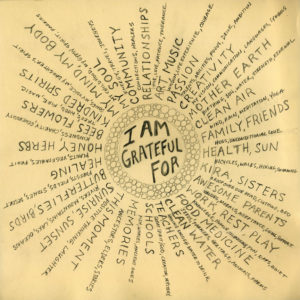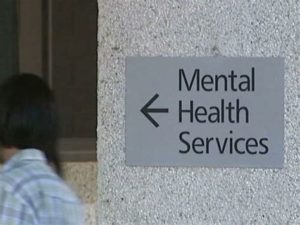Paul Mills, a professor from the University of California in San Diego, is the lead author of an article on the practice of Gratitude, and its effects on physical health and emotional wellbeing.
I have thought for some time that because – for obvious evolutionary reasons – the body is hardwired to prioritise danger and other bad stuff that happens or might happen to us, that we need to find a way to restore some balance by consciously remembering the good stuff, the stuff we can be grateful for.

It is particularly important for anyone who suffers from periodic episodes of depression, that when we feel “up” we make lists – the longer the better – of the good stuff, so that we have something to buoy us up when we feel “down.” The practice is also vital for those who are torn apart by their self-critical inner voices. I’ve prepared a leaflet detailing the practice for those clients, but here some general information:
Now, when things are bad, we may think, quite naturally, that there is nothing to be grateful for, but AT THE VERY LEAST we can be grateful that things aren’t even worse. I may feel like an incompetent, unattractive idiot who doesn’t deserve to have any friends, but I can be grateful that not everyone agrees with me! And we can usually do a lot better than that minimal and rather grudging example of gratitude, with practice.
I’m not asking you to lie to yourself. I’m asking you to treat yourself as if you were a person you need to care about.
And as with everything, exercising makes Gratitude stronger.
 The practice of gratitude is easy to explain: you get a small notebook and pencil, and place it by your bed. At really stressful times its a good idea to carry it around with you, actually. Every night when you get into bed and are ready to go to sleep, you open the book and, thinking back over the day, write down just three things that you are grateful for, as if you were your own loving friend. These items must be written as positive statements, so you phrase them without using not, never, don’t, etc. So, for example, instead of saying my leg didn’t ache so badly today, you would say that my leg felt better today. Instead of saying that I didn’t feel so depressed today, you say I felt a little lighter today. If it’s difficult for you to think of three things, then spend a few minutes reading back what you have written in your notebook already, and you will recall something suitable. If you have faith, you can think of it as the practice of counting your blessings from a loving God.
The practice of gratitude is easy to explain: you get a small notebook and pencil, and place it by your bed. At really stressful times its a good idea to carry it around with you, actually. Every night when you get into bed and are ready to go to sleep, you open the book and, thinking back over the day, write down just three things that you are grateful for, as if you were your own loving friend. These items must be written as positive statements, so you phrase them without using not, never, don’t, etc. So, for example, instead of saying my leg didn’t ache so badly today, you would say that my leg felt better today. Instead of saying that I didn’t feel so depressed today, you say I felt a little lighter today. If it’s difficult for you to think of three things, then spend a few minutes reading back what you have written in your notebook already, and you will recall something suitable. If you have faith, you can think of it as the practice of counting your blessings from a loving God.
Don’t expect instant results. It takes time for your brain to respond to this new, and initially difficult, way of thinking.
Gratitude practice activates the mammalian care-giving system which releases feel-good chemicals in our bodies (oxytocin and intrinsic opiates) and allows you to be self-compassionate, to deprogram the ingrained thinking habits, to feel much better.
By offering support and kindness to ourselves, we find that the body responds by feeling better.
And it has been shown to achieve a lot more for the body than “just” allowing it to feel better. Research using brain scans shows that after three months practice the medial prefrontal cortex has become much more sensitive, which helps to explains the steadily increasing effects of Gratitude practice that you will notice.
But Mills’ article talks about the physical effects too: “better mood, better sleep, less fatigue and lower levels of inflammatory biomarkers related to cardiac health.” The study involved 186 men and women who had been diagnosed with asymptomatic (Stage B – structural damage but no symptoms) heart failure for at least three months.
“We found that those patients who kept gratitude journals for those eight weeks showed reductions in circulating levels of several important inflammatory biomarkers, as well as an increase in heart rate variability while they wrote. Improved heart rate variability is considered a measure of reduced cardiac risk,” said Mills. “It seems that a more grateful heart is indeed a more healthy heart, and that gratitude journaling is an easy way to support cardiac health.”
Wow!
The full study is published by the American Psychological Association here (link to pdf)
I originally published this article in January 2017, but have updated and renamed it as new research is reported.

 Firstly, I was questioned as to whether private therapy was good value compared to the NHS – “The NHS has got to be doing it cheaper, hasn’t it!” was what was said to me. And there certainly wasn’t a question mark at the end of her sentence.
Firstly, I was questioned as to whether private therapy was good value compared to the NHS – “The NHS has got to be doing it cheaper, hasn’t it!” was what was said to me. And there certainly wasn’t a question mark at the end of her sentence.
 It’s true that most clients who come for the first session will continue for a course of sessions, be that six sessions – my suggested course – or longer. And the overwhelming majority of those clients will come to feel that the experience offers extraordinary value for money. But if they don’t want to return I am delighted to offer a refund. In a way it could be argued that I’m paying these clients not to return! Why? – because I only want to work with clients who really, really want to work with me.
It’s true that most clients who come for the first session will continue for a course of sessions, be that six sessions – my suggested course – or longer. And the overwhelming majority of those clients will come to feel that the experience offers extraordinary value for money. But if they don’t want to return I am delighted to offer a refund. In a way it could be argued that I’m paying these clients not to return! Why? – because I only want to work with clients who really, really want to work with me. My sister is waiting to see if she has bipolar disorder, and it is affecting our whole family. Would a few therapy sessions with you help while we wait for an NHS appointment for her? (You did not leave me an email address so I am replying to your questions here, having changed some of the details).
My sister is waiting to see if she has bipolar disorder, and it is affecting our whole family. Would a few therapy sessions with you help while we wait for an NHS appointment for her? (You did not leave me an email address so I am replying to your questions here, having changed some of the details).